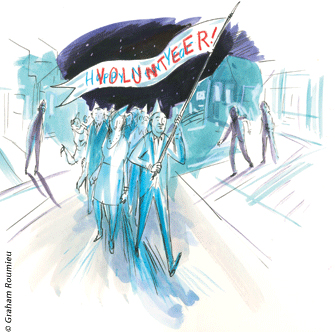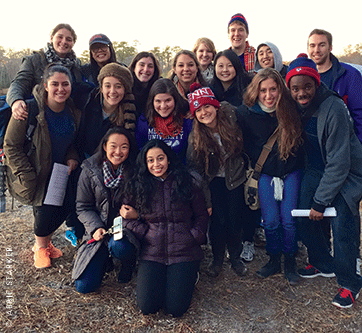
Class of ’00 | By all means, lose weight in 2012. Definitely quit smoking. While you’re at it, you might try to save more money, get more organized, or finally plan that dream trip.
Those are some of the most common New Year’s resolutions we make each year. “And they’re worthy goals, without a doubt,” says Penn’s chaplain, the Rev. Charles L. “Chaz” Howard C’00. “I’ve made those sorts of resolutions myself for years.”
But these days, Howard has some new ideas about this venerable tradition.
“What if we challenged ourselves to reverse that inward focus?” he says. “What if we looked to serve others, not ourselves, with our resolutions?” One person might commit to volunteering at a homeless shelter; another might become a mentor to a teen stuck in the child-welfare system. “We could do a whole lot of good,” he adds, “and still feel better about ourselves in the process.”
The idea came to him during a long talk in the summer of 2010 with a couple of friends, Len Matty and Nathan Jones. The three men, who had worked together on various nonprofit projects, were looking for a new way to encourage others to make longer-lasting commitments to service.
Howard had been organizing annual benefit concerts and fundraisers for years, trying to raise awareness about poverty and homelessness. He’d edited and contributed several articles to the essay collection The Souls of Poor Folk, the proceeds of which were donated to charities. But it seemed that most of the action he prompted others to take on behalf of the poor was short-lived. The book sales peaked and then dwindled; people gave at a concert or fundraiser and then walked away.
“And then it suddenly occurred to us that we didn’t have to invent a new ‘thing,’” says Howard. “People were already steeped in the idea of making a commitment to change something at the start of each year. The only issue would be convincing folks to revise their perspective on New Year’s resolutions, to make that switch.
“It felt so simple, and yet so revolutionary.”
Howard, Matty, and Jones called the new approach Resolution ’11. As Penn’s chaplain, Howard saw the idea of creating a social movement around this issue as congruent with his role as a moral and spiritual leader.
By November of 2010 they had a website (resolution11.org), along with an email address and a Facebook and Twitter account.
“Then, we waited,” says Howard. “We figured if we got a hundred resolutions, we’d consider it a success.”
Howard estimates they got five times that, at least, thanks in large part to a brief flurry of media attention. He was invited to write a guest post (which has since become a guest column) on The Huffington Post, which led to an invitation to appear on Dan Gottlieb’s popular “Voices in the Family” radio show on WHYY. A story on the project in The Philadelphia Inquirer was then picked up by several blogs and smaller local publications.
“People were responding positively everywhere we turned,” Howard says. “I wouldn’t necessarily say it went viral, but we did get resolutions from people as far away as China, England, Ghana, Australia. They were resolving to give money, to volunteer, to write letters to soldiers, to save animals, to feed people. It was wonderful.”
As another new year approaches, Howard is ready to make Resolution ’12 (resolution12.org) bigger and better than Resolution ’11. One way he’ll do that is by partnering with a group of freshmen from Wharton’s Management 100 class. The class, required for all Wharton undergraduates, is a hands-on immersion experience in business principles and group dynamics; local nonprofits come to the class to pitch a project, and the students assigned to it are charged with developing, marketing, and executing that project. Among other strategies, the Resolution ’12 group plans to produce a series of short videos and beef up the project’s social-media presence. Howard’s team is also enhanced by the support of several other Penn students and alumni, including Ankit Shah W’13 and Danielle Heitman C’10.
Where will the project will go from there? “Hopefully, nowhere,” says Howard. “I mean, the hope is that we’re changing the culture, changing the tradition of resolution-making. When Ryan Seacrest is up there announcing the ball drop, we hope it becomes a more natural part of the discussion around New Year’s. I would love it if five years from now something like Resolution ’12 doesn’t need to happen, because people are just doing it anyway. And I think we’re getting there.”
—Rachel Estrada Ryan C’00




